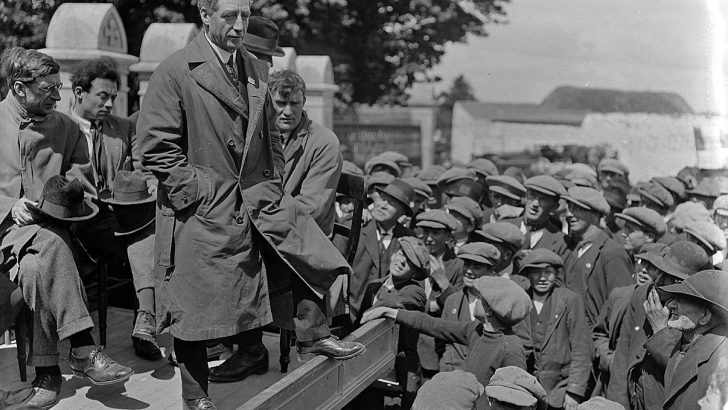Cathal Brugha
by Fergus O’Farrell (UCD Press, €17.00)
Cathal Brugha was a leading figure in Ireland’s revolutionary period. He remains among the most significant yet controversial of all the leaders who contributed to the making of an independent Ireland.
He was born in Dublin on July 18, 1874. Having attended Belvedere College, he was employed as a clerk in Hayes & Finch, a church supplies firm. Later he co-founded Lalor Ltd, a candle-making firm, where he was a director and the travelling salesman.
From 1899 onwards he was a committed ‘Irish Irelander’. In that year he joined the Gaelic League, became fluent in Irish and changed his name from Charles Burgess to Cathal Brugha. Joining the IRB in 1908, he swore others into the secret organisation as he travelled around the country. He joined the Irish Volunteers at the inaugural meeting in November 1913.
Wounds
During Easter week 1916, as vice-commandant to Éamon Ceannt, he was involved in the fierce fighting in the South Dublin Union complex of buildings. When the fighting ended Brugha, with multiple wounds and little hope that he would survive, was evacuated to hospital.
After leaving hospital Brugha set about reviving the Volunteer movement. He was elected to the Sinn Féin executive committee in October 1917. During the conscription crisis in the Spring of 1918 he travelled to London with twelve volunteers, intent on assassinating members of the British cabinet in the House of Commons if conscription was imposed on Ireland. Later, during the War of Independence, he was obsessed by this project and took steps to have it carried out.
Brugha was elected TD for Waterford in December 1918. He attended the first meeting of Dáil Éireann on January 22, 1919 and was appointed minister of defence. Alongside him in the cabinet was Michael Collins, minister for finance, and Austin Stack, Minister for Home Affairs.
Apart from his position in the cabinet, Collins was IRA adjutant-general and director of intelligence, areas Brugha regarded as coming within the domain of his ministry. Apart from conflicts of authority with Collins, it seems, he also became intensely jealous of the high regard in which Collins was held by his peers. At the same time Austin Stack was nursing resentment against Collins who had publicly criticised his inept handling of his ministry.
The result was a close relationship between Brugha and Stack, partially based on their antipathy to Collins. That antagonism also suggests that Brugha’s attempts to make the IRA answerable to his department was motivated as much to end Collins’ ‘interference’ as to establish a clear line of responsibility between Dáil Éireann and the IRA.
Brugha declined membership of the delegation selected to negotiate with the British government in September 1921. He opposed the Anglo-Irish Treaty and in the debate on it in the Dáil described it as ‘national suicide’. In his address he attacked Collins in the bitterest of terms.
After the Dáil voted in favour of the Treaty, Brugha was replaced as minister of defence by Richard Mulcahy. He became vice-President of the anti-treaty Cumann na Poblachta in early March 1922 and in that capacity attended the anti-treaty IRA conference of March 16-17. He was elected Sinn Fein (anti-Treaty) TD for Waterford /Tipperary East on June 16.
When the civil war began on June 28 with the shelling of the Four Courts, Brugha reported for duty at the Hamman Hotel in upper O’Connell Street which had been take over by anti-treatyites. It became untenable on July 5 and with the Irish Free State soldiers closing in on it he was gravely wounded and died two days later in the Mater Hospital on July 7, 1922.
Ignoring Brugha’s obsession with the Jihadist-like plan to assassinate British ministers in the House of Commons, the author claims that he was ‘innately political’.
A more authentic assessment is to be found in a comment attributed to Collins on hearing that Brugha had died: “Because of his sincerity, I would forgive him for anything. At worst he was a fanatic, though in what has been a noble cause. At best I remember him among the very few who have given their all… that this country should have its freedom. When many of us are forgotten, Cathal Brugha will be remembered.”


 Cathal Brugha in Kilkenny urging resistence to the Treaty (De Valera is seated behind him).
Cathal Brugha in Kilkenny urging resistence to the Treaty (De Valera is seated behind him). 